Keep Your Workspace Warm with the Best Garage Heaters for 2024
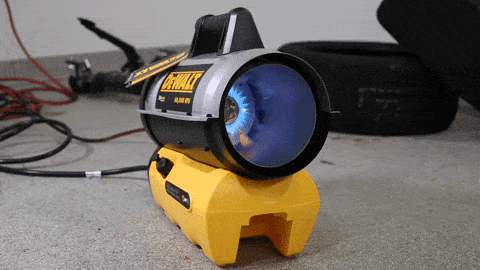
"Hearst Magazines and Yahoo may earn commission or revenue on some items through these links."
The last thing you want to worry about when working on your car is whether or not your workspace is warm. There's little worse than pinching a cold finger between pliers or laying on a cold floor. Whether you're a DIY enthusiast, a professional mechanic, or merely want to turn your garage into a cozy space during the colder months, a reliable and efficient garage heater is a must-have, and we've got you covered.
In this roundup, we've scoured the garage heater market to bring you the best garage heaters that cater to various needs, budgets, and preferences. We've put each contender through rigorous testing, assessing their heating capabilities, safety features, energy efficiency, and ease of installation, and have wrapped up our conclusions in the roundup below.
Grab a cup of cocoa or coffee and join us as we explore the world of garage heaters, breaking down the pros and cons of each model and unveiling the top picks that will keep your garage toasty warm all winter long.
What to Consider
When shopping for a garage heater, there are several factors to consider to ensure you choose the right one for your specific needs. Here are some key aspects to think about:
Heating Capacity
It's essential to determine the size of your garage and the desired temperature increase to find a heater with the appropriate heating capacity (measured in BTUs or watts). Larger garages require a heater with a higher output, while smaller spaces can be sufficiently heated with lower-capacity models.
Energy Source
Garage heaters are almost always powered by one of five energy sources: electricity, natural gas, propane, diesel, or kerosene. Each type has its advantages and drawbacks. Electric heaters are generally more convenient and energy-efficient, while natural gas, propane, diesel and kerosene heaters offer more powerful heating options. Take into account power sources in your garage and the long-term operating costs when deciding which fuel source is best for your needs.
Energy Efficiency
Energy efficiency is crucial, as it directly impacts your energy bills. Choose a heater with a high energy efficiency rating to save on utility costs. Features like adjustable thermostats, timers, and eco modes can also help you maintain a comfortable temperature while reducing energy consumption.
Safety Features
Safety should always be a priority. Look for heaters with built-in safety features such as tip-over protection, overheat protection, and cool-to-touch exteriors. Additionally, make sure the heater you choose is certified by a reputable testing organization like UL, CSA, or ETL.
Installation and Portability
Consider whether you prefer a permanent installation or a portable heater that you can move around your garage. Permanent options like wall or ceiling-mounted heaters typically require professional installation. Portable models, on the other hand, offer greater flexibility and can be easily moved or stored when not in use.
Noise Level
Garage heaters can generate noise, which may be a concern if you're working in the space for extended periods. Check the noise level (measured in decibels) of the heaters you're considering, and opt for a quieter model if noise is a concern.
By considering each of these factors, you'll be better equipped to find the ideal garage heater that caters to your specific requirements and ensures a comfortable workspace during the colder months.
Ever try to work on your car or other project in a cold garage or workshop? It's a pain in the, er, fingers. You can bundle up, but coats and jackets can be cumbersome and limit mobility, and trying to wrangle small parts or do detailed, intricate work while wearing gloves? Forget it.
Whether you're a pro mechanic who spends long hours in a concrete shop, a DIY enthusiast who tinkers on the weekends, or merely a homeowner who wants to keep their garage or workshop comfortable, a reliable and efficient heater is essential. The Gear Team acquired six of the most popular portable garage heaters on the market of assorted types and styles, and for various needs, budgets, and preferences. We put them all through detailed, measured testing, assessing their heating capabilities, safety features, energy efficiency, and ease of installation. Here's what we found.
Things to Consider
When shopping for a garage or shop heater, there are a number of important factors to think about to make sure you choose the right heater for your workspace.
Environment
Do you live in a place where it's cold and/or snowy during the winter months, and you need to fully warm up an entire space for long hours? Or are you just looking for a smaller heater to take the occasional chill off? Do you need to fully heat an entire space, or just warm up the corner where you work? Knowing what you need to heat will determine what kind of heater you'll need—and how much you'll need to pay for it.
Heating Capacity
Use the size (in square footage) of the space you want to heat to locate a heater with the appropriate heating capacity (measured in BTUs or watts). Naturally, large spaces such as two-and three-car garages will require a higher output heater, while smaller spaces such as workshops and "she-sheds" can usually get by with a less-expensive, lower-capacity heater. A general rule of thumb is to use 10 watts per square foot for electric heaters, or 45 BTUs per square foot for gas heaters.
If you keep a desk or workbench in a corner of your garage or workshop, and you spend most of your time in that area, you may not need to spend the money on a large-capacity heater (let alone the energy required to run it) to heat the entire space. Think carefully before you buy; garage heaters, especially the big ones, do not come cheap.
Fuel Source
Take into account the power sources in your garage and long-term operating costs when deciding which fuel source is best for your needs. Garage heaters are almost always powered by one of five energy sources:
Electricity
Natural gas
Propane
Diesel
Kerosene
Each has its advantages and drawbacks. Electric heaters are generally more convenient while natural gas, propane, diesel, and kerosene heaters usually offer more powerful heating options.
Energy Efficiency
How much your garage heater will ultimately cost you depends directly on the unit's energy efficiency. Electric heaters are typically 100% energy efficient (at their source), because they convert all of the electricity they draw into heat. However, depending on your electricity rates, an electric heater can be more expensive to run compared to gas heaters—especially if you're heating a larger space. Gas heaters have slightly lower energy efficiency due to heat loss during combustion, but gas usually cheaper than electricity. Generally, gas heaters are more cost-effective for larger spaces than electric heaters.
Features like adjustable thermostats, timers, auto shut-off, and eco modes can also help you maintain a comfortable temperature while reducing energy consumption. Products with the blue "Energy Star" logo are proven to adhere to a certain set of energy efficiency requirements. Look for the familiar blue logo when purchasing any electronic appliance.
Safety Features
The U.S. Consumer Product Safety Commission estimates that portable space heaters cause about 1,200 injuries each year. Garage heaters—and all space heaters, frankly—represent a potential fire hazard if used improperly.
Look for heaters with built-in safety features such as overheat protection, tip-over shut-off, and cool-to-touch exteriors. Additionally, make sure the heater you choose is certified by a reputable testing organization like UL, CSA, or ETL.
Installation and Portability
Consider whether you prefer a permanent installation or a portable heater that you can move around your garage. Permanent options like wall- or ceiling-mounted heaters typically require professional installation. Portable space heaters offer greater flexibility and can be easily moved or stored when not in use.
Noise Level
Certain portable garage heaters can be quite loud. Check the noise level (measured in decibels) of the heaters you're considering, and opt for a quieter model if noise is a concern.
How the Gear Team Evaluated Garage Heaters
Our testing process involved assessing garage heaters under similar conditions and measuring their heating efficiency, heat distribution, and safety features. We used a thermostat to monitor temperature changes, a thermal camera to visualize heat output, and took measurements at various locations in the garage to provide a complete overview.
Elements we tested:
Heating performance over 15 minutes
Heat distribution pattern
Temperature measurements at specific locations
Noise level (dBA)
Safety concerns and special requirements for certain heater types
Tools used: Innova 3360 thermal camera, ZOTO PM6530D infrared thermometer, Dab-Tek JSN-997 CO detector
We compiled our notes to decide which heaters are best for specific-use cases, narrowing down our top picks. Here are the best garage heaters you can buy.
Mr. Heater Big Buddy
The Mr. Heater Big Buddy Portable Propane Heater is a compact yet powerful heater capable of warming up to 450 square feet with its maximum 18,000 BTU output. It's lightweight, easy to use, portable, and doesn't require batteries or cords.
The unit can run on one or two 1-pound propane tanks, or it can be hooked up to larger tanks with a separate hose and filter. With two 1-pounders, the heater will run on Low (4000 BTUs) for a claimed 10 hours, Medium (9000 BTUs) for 4.5 hours, and High (18,000 BTUs) for two hours. When operated properly, the Big Buddy is safe to use indoors and, for extra reassurance, the unit has three safety systems: an emergency low-oxygen safety system, a tip-over switch, and a thermal shut-down system.
We found the heat output to be impressive considering its size. Since it doesn't have a fan, the heat mainly rises directly off the unit, but if you have lower ceilings in your garage, it should start heating up your workspace in a matter of minutes. We wouldn't suggest this for much more than a two-car garage or a shop less than 450 square feet.

Mr. Heater Big Buddy
amazon.com
$150.53
Gannon Burgett - Car and DriverHeat Hog 9000 BTU Propane Heater
Heat Hog? It almost made us want to roast a hot dog in front of this thing. In all seriousness though, this 9000 BTU propane heater is a solid choice for anyone wanting portable heat in a compact package. Similar to Mr. Heater's 'Buddy' lineup, the Heat Hog is available in three different strengths: 4000, 9000, and 18,000 BTU.
For this test, we used the 9000 BTU, which runs on either a single 1-pound propane tank or a larger propane tank with a separate adapter. Functionally, it performed nearly identically to the Big Buddy, but the Heat Hog can tilt for more directional heating. The Heat Hog also has tip-over and oxygen-depletion sensors.
Heat Hog suggests using this for areas no larger than 225 square feet and we'd agree. It's enough to heat up a single-car garage, but you'll want to jump up to the 18,000 BTU model if you plan on keeping a two-car garage warm in the winter months.

Heat Hog 9000 BTU Propane Heater
amazon.com
$99.99
Gannon Burgett - Car and DriverDeWalt 68,000 BTU Forced Air Propane Heater
If you want a fast and versatile propane heater for your garage, you'll be hard-pressed to find a better option than DeWalt's DXH70CFAV. This machine offers a range of output and can be powered by either a standard 120-volt wall socket or a DeWalt MAX 20V battery, making it one of the more versatile units we tested.
The only assembly required was attaching the handle with four bolts. With that done, installation was as simple as connecting a propane source and plugging it into the wall. The outlet (or battery) is used to power the initial spark and the integrated fan, which pumps out heat at an impressive rate, especially at full strength.
Even at lower output levels, this unit would have no problem heating up a two-car garage (~360 square feet), and at higher levels, you could likely keep a small barn toasty if you give it twenty minutes to heat up.
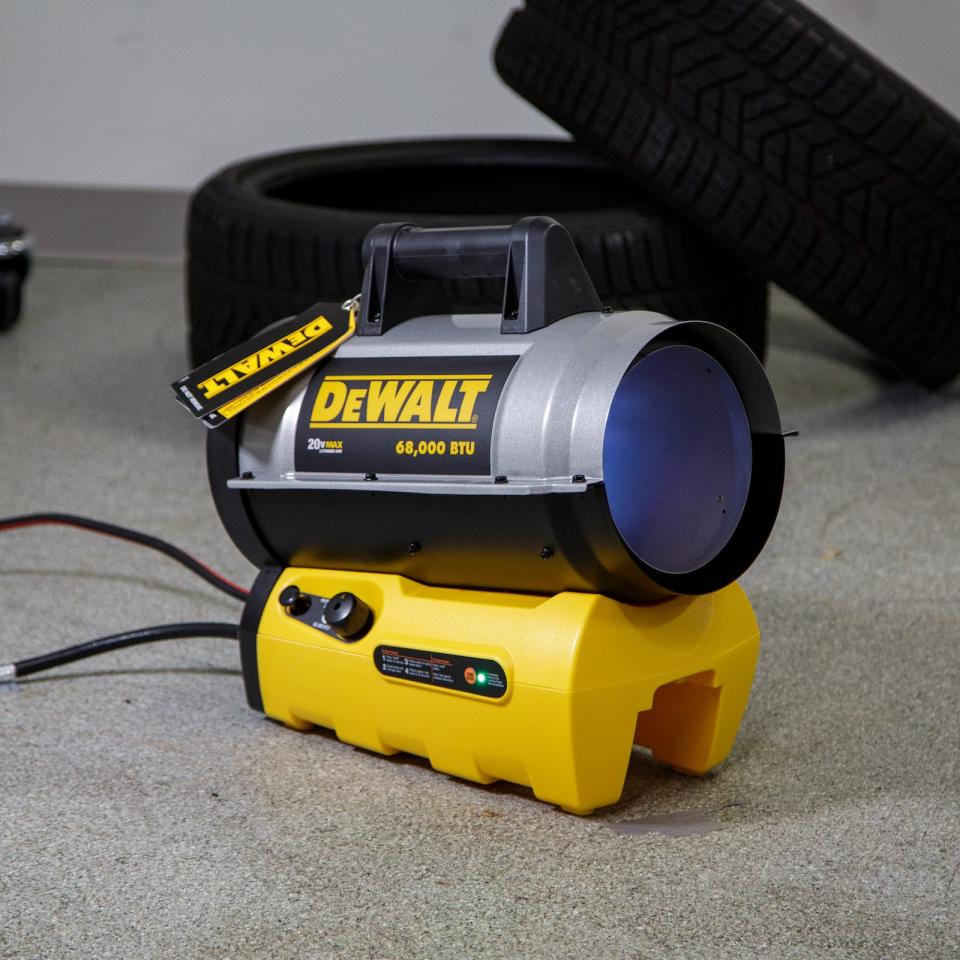
DeWalt 68,000 BTU Forced Air Propane Heater
amazon.com
$185.99
Gannon Burgett - Car and DriverRemington 80,000 BTU Diesel/Kerosene Heater
This Remington 80,000 BTU behemoth is not for the faint of heart. Fueled by either diesel or kerosene and powered by a wall outlet for the integrated fan, this heater quite literally spits fire and smells as though you're standing next to an idling semi. It's also extremely heavy and lacks controls for dialing in the output—it's all or nothing.
That said, if you need a large space heated up quickly, this will get the job done. In a matter of 15 minutes, it heated up the Car and Driver garage from 53 to 61 degrees, and that was with the garage door slightly open on a 38-degree day.
This is less a garage heater and more of a dedicated workshop or barn heater. You won't want anything to be within 10 feet of this heater's flame, and you won't want to walk any closer than three or four feet. But for large areas with proper ventilation, this heater will get the job done quickly.
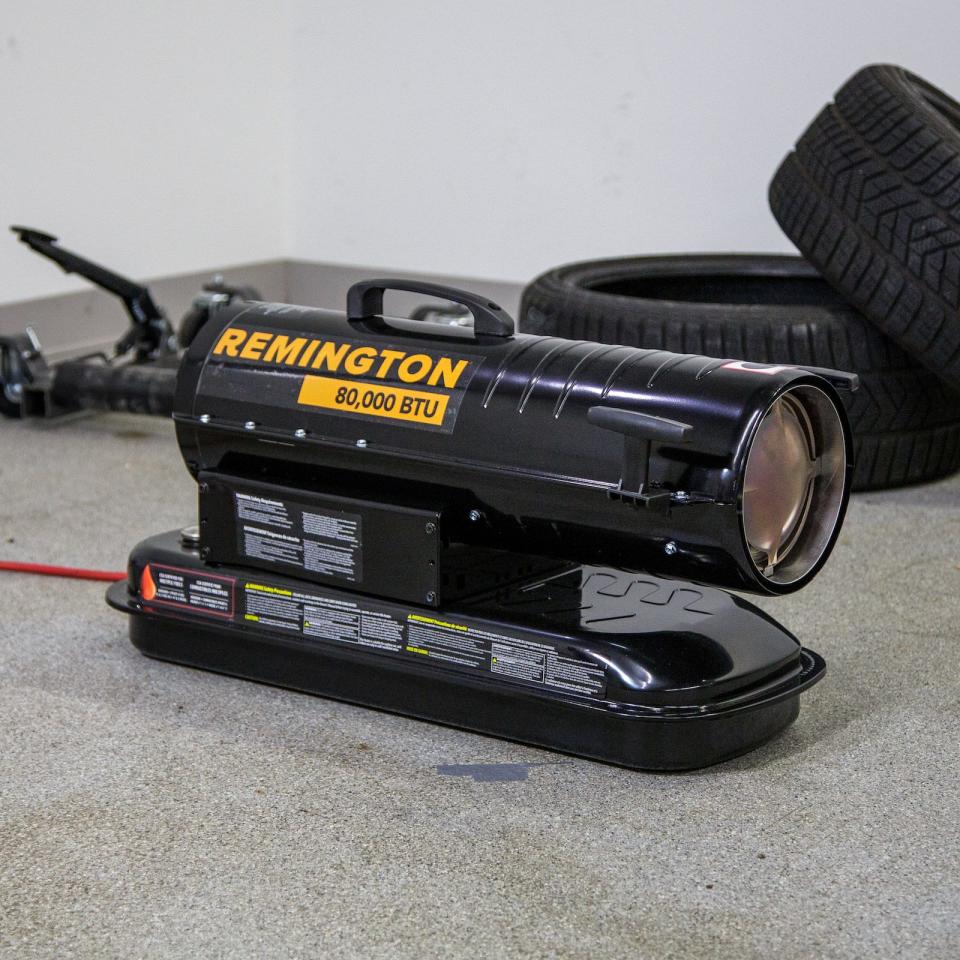
Remington 80,000 BTU Diesel/Kerosene Heater
amazon.com
$256.54
Gannon Burgett - Car and DriverBriza Infrared Patio Heater
If you want quick, energy-efficient heat, this is our pick. Briza's Infrared Patio Heater can either be mounted in your garage or used with the included tripod stand and creates a much different type of heat.
Infrared heaters are often found in outdoor cafes and patios. They're designed to heat up objects and people quickly, with minimal energy wasted on heating up the surrounding air. The benefit of this is that very little energy is wasted; the drawback is you typically won't feel the heat unless you're directly in front of it.
We found the Briza to be incredibly effective in keeping us warm when we were in its path. However, move away from where it's pointed, and you'll quickly go back to being cold. For this reason, it's our recommendation that you only consider this if you don't mind moving it around as needed, or plan on mounting it atop or above a workbench where you might spend the majority of your time during the colder months.
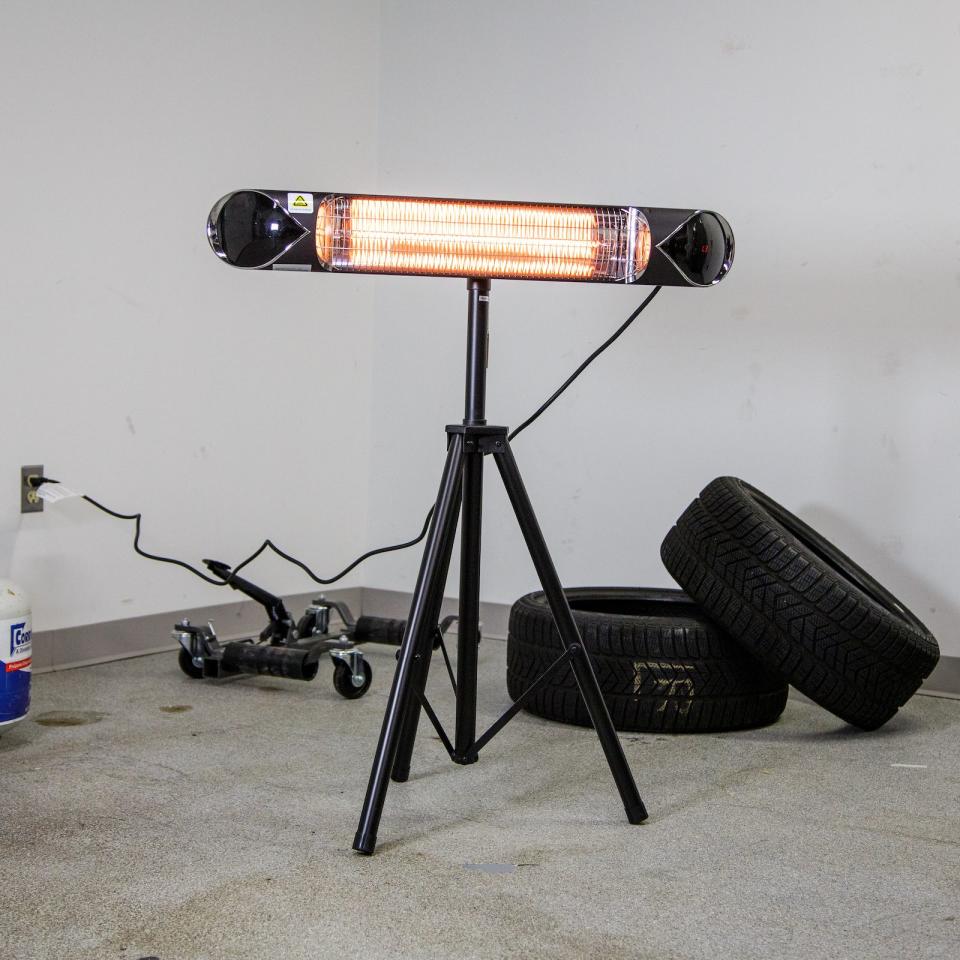
Briza Infrared Patio Heater
amazon.com
$195.88
Gannon Burgett - Car and DriverIsiler 1500W Portable Ceramic Heater
If all you need to do is keep your digits from freezing while at your workbench, this Isliler Ceramic Heater is the one for you. It's not going to keep even a single-car garage warm in colder weather, but it will keep a small workbench area warmer.
The unit is practically silent and offers solid heat output considering its compact size. The integrated fan is subtle but offers just enough power to keep the air moving across the workspace, which helps keep your fingers agile when working on parts.
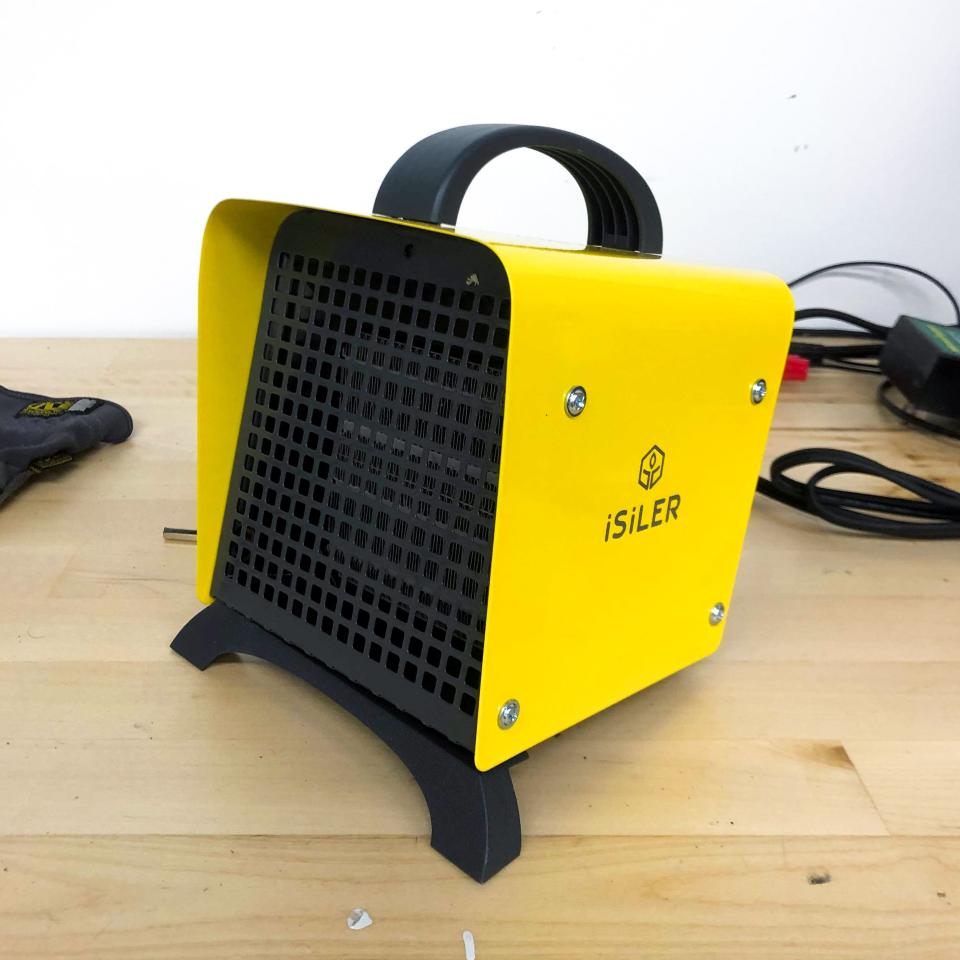
Isiler 1500W Portable Ceramic Heater
amazon.com
$29.99
Katherine Keeler - Car and DriverHow We Tested Garage Heaters
On a cold Michigan day, we opened the garage door to allow the temperature to drop to 50 degrees Fahrenheit. After closing the garage door, we positioned each heater in the same location, and let it run for 15 minutes. We monitored the overall increase in temperature inside the garage using a thermostat.
To evaluate heat distribution, we used a thermal camera to visualize the heat output of each heater. This allowed us to better understand how the heaters warmed up the space and whether they distributed heat evenly.
Following the 15-minute testing period, we took temperature readings at various locations around the heater. Specifically, we measured the temperature 10 feet in front of the heater, the ceiling directly above the heater, and the outer surface of the heater. This provided a comprehensive view of the heater's performance and potential safety concerns.
Due to the safety requirements of this type of heater, we tested the Remington with the garage door cracked open to allow for proper ventilation. Even with the garage door open, however, it managed to (unsurprisingly) beat all of the other heaters in terms of raw output.

FAQs
What safety features should I look for?
Automatic shut-off: This feature automatically turns off the heater if it gets too hot or if it detects a lack of oxygen in the room. This is especially important for propane or natural gas heaters, which can produce carbon monoxide if not properly vented.
Tip-over switch: A tip-over switch will turn off the heater if it is accidentally knocked over, which can prevent fires and other accidents.
Overheat protection: This feature automatically turns off the heater if it reaches a certain temperature, which can prevent fires and other accidents.
Thermostat: A thermostat allows you to set the desired temperature and will turn the heater on and off as needed to maintain that temperature. This can help prevent overheating and other safety hazards.
Cool-touch exterior: Heaters with a cool-touch exterior are less likely to cause burns or other injuries if accidentally touched.
What types of garage heaters are available?
There are several types of garage heaters available, including propane heaters, natural gas heaters, electric heaters, and infrared heaters.
How do I choose the right size garage heater?
The size of the heater you need depends on the size of your garage, insulation quality, and the desired temperature increase. A general rule is to use 10 watts per square foot for electric heaters or 45 BTUs per square foot for gas heaters.
Can I use a garage heater in an enclosed space?
It depends. Propane and natural gas heaters require proper ventilation to prevent carbon monoxide buildup, while electric heaters and infrared heaters can be used in enclosed spaces.
How do I install a garage heater?
The installation process will vary depending on the type of heater you have. It's important to follow the manufacturer's instructions carefully and to hire a professional if you're not comfortable with the installation process.
Are garage heaters safe to use?
Garage heaters are typically safe to use if operated correctly and with the necessary safety features activated. It's essential to follow all the manufacturer's safety guidelines and never leave a heater unattended while in use.
What are the different fuel/energy sources?
Natural Gas: Natural gas is a clean-burning fuel source that is generally less expensive than other fuels. It requires the installation of a natural gas line in your garage, but once installed, it’s a reliable and efficient way to heat your space.
Propane: Propane is a liquid petroleum gas that is commonly used in portable heaters. It's a versatile fuel source that can be easily transported and stored in tanks.
Wood: Wood-burning heaters are a traditional option for heating garages and workshops. They require a constant supply of firewood, but they offer a cozy, rustic atmosphere.
Electric: Electric heaters are a clean and efficient option for heating smaller spaces, such as garages or workshops. They come in a variety of sizes and styles, and they're generally easy to use and maintain.
Diesel/Kerosene: Diesel and kerosene heaters are popular choices for commercial garages and workshops. They require either constant refueling or a fuel line to be installed, but they offer a high heat output and can quickly warm up large spaces.
Why Trust Us
Hearst Autos combines the talent, resources, and expertise of three of the largest, most influential automotive publications in the world. The Gear Team has tested a wide variety of automotive products, parts, accessories, and gear, such as gps trackers for cars, car ramps, and mechanics creepers. We get our hands on each and every product we test. Most are purchased; some are supplied by manufacturers.
Hearst Autos doesn't need to game algorithms for traffic or promote lousy products to earn a buck. Instead, we're concerned with our legacy, our reputation, and the trust that our readers have in Autoweek, Car and Driver, and Road & Track to deliver honest opinions and expert evaluations.
Visit our Tested & Trusted page to see the very best in automotive gear. Read more about our product testing and evaluation process here.

You Might Also Like

 Yahoo Autos
Yahoo Autos 